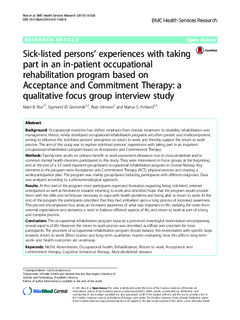Sick-listed persons’ experiences with taking part in an in-patient occupational rehabilitation program based on Acceptance and Commitment Therapy: a qualitative focus group interview study
Journal article, Peer reviewed
Permanent lenke
http://hdl.handle.net/11250/2366373Utgivelsesdato
2015Metadata
Vis full innførselSamlinger
Sammendrag
Background: Occupational medicine has shifted emphasis from disease treatment to disability rehabilitation and
management. Hence, newly developed occupational rehabilitation programs are often generic and multicomponent,
aiming to influence the sick-listed persons’ perception on return to work, and thereby support the return to work
process. The aim of this study was to explore sick-listed persons’ experiences with taking part in an in-patient
occupational rehabilitation program based on Acceptance and Commitment Therapy.
Methods: Twenty-nine adults on sickness benefit or work assessment allowance due to musculoskeletal and/or
common mental health disorders participated in this study. They were interviewed in focus groups at the beginning
and at the end of a 3.5 week inpatient group-based occupational rehabilitation program in Central Norway. Key
elements in the program were Acceptance and Commitment Therapy (ACT), physical exercise and creating a
work-participation plan. The program was mainly group-based including participants with different diagnoses. Data
was analyzed according to a phenomenological approach.
Results: At the start of the program most participants expressed frustration regarding being sick-listed, external
anticipations as well as hindrances towards returning to work, and described hope that the program would provide
them with the skills and techniques necessary to cope with health problems and being able to return to work. At the
end of the program the participants described that they had embarked upon a long process of increased awareness.
This process encompassed four areas; an increased awareness of what was important in life, realizing the strain from
external expectations and demands, a need to balance different aspects of life, and return to work as part of a long
and complex process.
Conclusions: The occupational rehabilitation program induced a perceived meaningful reorientation encompassing
several aspects of life. However, the return to work process was described as diffuse and uncertain for most
participants. The providers of occupational rehabilitation program should balance this reorientation with specific steps
towards return to work. Effect studies and long-term qualitative studies evaluating how this affects long-term
work- and health outcomes are underway.
Keywords: MeSH, Absenteeism, Occupational health, Rehabilitation, Return to work, Acceptance and
commitment therapy, Cognitive behaviour therapy, Musculoskeletal diseases.
